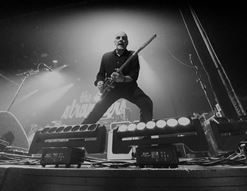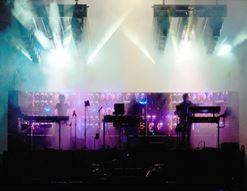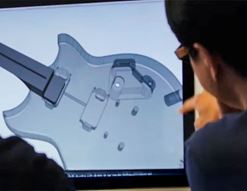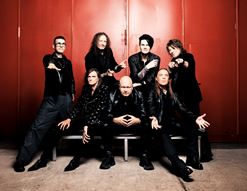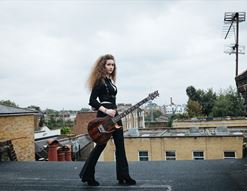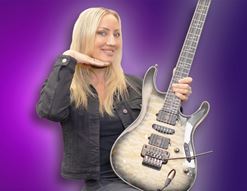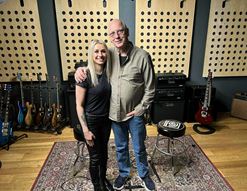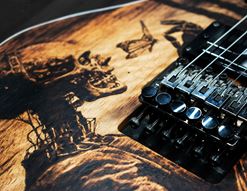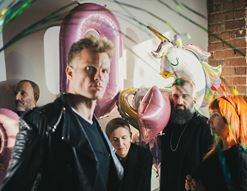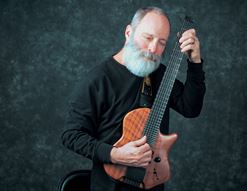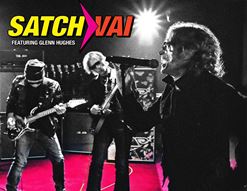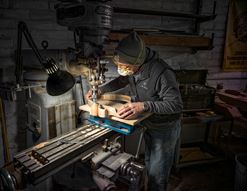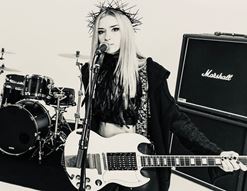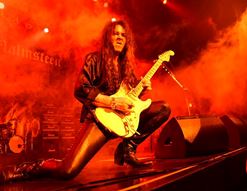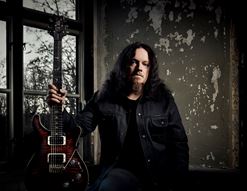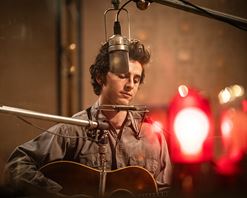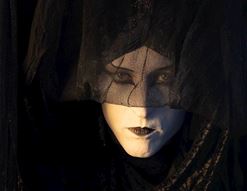Have you ever wanted to be a session musician? Travelling the world, playing music for a job and meeting all kinds of people?
It sounds amazing, and of course, you need to be pretty excellent on your instrument, but there’s a lot more to it than that. Mike Patrick knows this first-hand, as he is a hugely in-demand piano and keys player who has toured with a wide range of pop artists as well as chasing his passion for gospel and R&B music. A Yamaha artist, Mike carries his trusty Montage keyboards across the planet, playing huge venues and trying to find time to squeeze in some personal music-making.
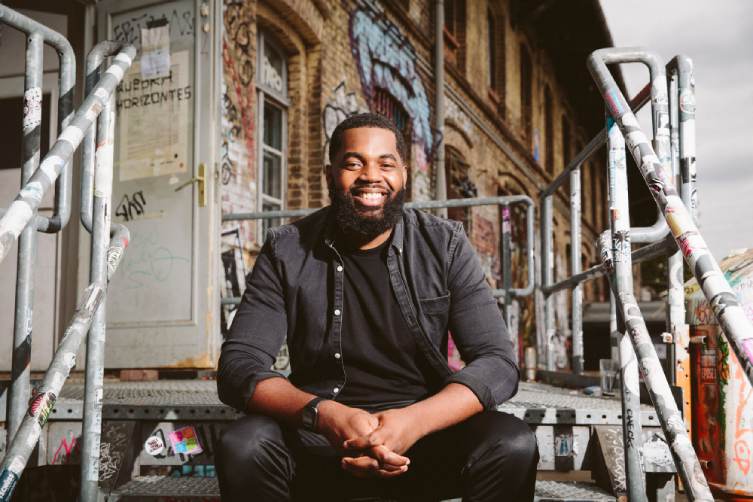
Luckily for me, on one particular day off whilst on tour in Lincoln, Nebraska, Mike had set aside a small window of time to talk with me via Zoom. I wanted to know how he started, how he continued and how he has prospered as a session player. Easily one of the nicest people I’ve spoken too, Mike also had in-depth, useful and informative answers to all of my queries. The conversation has become an indispensable guide to being a session player.
So, check out the fully transcribed interview below and learn just what you really need to make it at the session game…
Contents
Pianos, Keyboards, Synths and Yamaha Love
Right Place, Right Time
Guitarguitar: The first thing I would always like to ask a touring session musician, who's playing with lots of different people, is: was that a route that you actively sought out? Or is that something that kind of happened along the way?
Mike Patrick: You know what, it's funny, because it definitely was a route that I wanted to go down, but I had no idea how to get down that route. There's no real roadmap to playing for artists, it's like, I used to ask people and be like, okay, how do I get playing for artists and stuff? Everyone would always say ‘you've got to be at the right place at the right time’. And I was kind of like what does that actually mean? (laughs) I wanted to do it step by step and never really got it, but somehow just playing for one artist and kind of being in the circuit showing your face, it has turned out that way which I'm super grateful for.
I wanted to go down this route but I didn't know how, but I think it really has been just being in the right place at the right time and trying to connect and kind of network as much as possible which is kind of the boring part (laughs) but yeah, it has worked out which is all good.
GG: Okay, so being in the right place at the right time. When someone else said that to you you're like ‘what is the right place? What is the right time?” At the beginning, what was the right place at the right time for your particular story?
MP: So I actually started playing a lot of open mics. I got called to do one open mic and it turned out that it was every Monday. I was only supposed to do that one week but I was like ‘I really want to impress’ and I wanted to put my best foot forward because I didn't have any gigs. I wasn't playing for anybody at that point and I did that open mic, and they turned around and were like ‘would you like to stay?’
I basically stayed doing that open mic for years and years to the point where at one point it was every Monday, so you'd learn 16 songs, play them in London and then by the Tuesday you get another 16 songs for the next artists. I used to kind of run the band there, and doing that particular open mic opened up so many doors because every single artist in the UK in terms of pop and R&B and grime at the time went through that open mic!
It's almost like it opened the door to meet lots of different people but it also gave me a lot of exposure because a lot of different people would come through, like managers and stuff, and they would say, ‘oh, well there's a band here, they're good like let's stay in touch’. We've got a lot of work out that, a lot of exposure, like if someone was after a keyboard player they'd be like, ‘oh well, try Mike Patrick’, you know? ‘He's played here and sounds decent’, and it built from there which is great.
GG: I see, so with that open mic night, you weren't going there as like, ‘I have a song to sing’: you were going there and learning in advance the songs that other people were wanting to perform when you were backing them up.
MP: Yeah, basically, and everybody - on that open mic alone I learned I played for Jesse J, for Emily Sande…there were so many artists that came with us during a maybe six year period. I was literally learning other people's music and then they would do like two or three songs, and you'd learn them, play them and then that was it, but was good practice because by the time it came to learning to play people's music for tours, I had so much practice in terms of just being in a really high pressure kind of situation.
GG: I can imagine! One of my questions was going to be about building a reputation, that's actually kind of what you've answered! But at that point, when you're then on tour, you're away from the open mic and people are actually calling for you or they’re referring to you, how does that transfer? Because as you just said at the beginning of our conversation, there's no good man, but no A-B-Cs to the job. How did that go from being you as a go-to guy to being someone who is always busy?
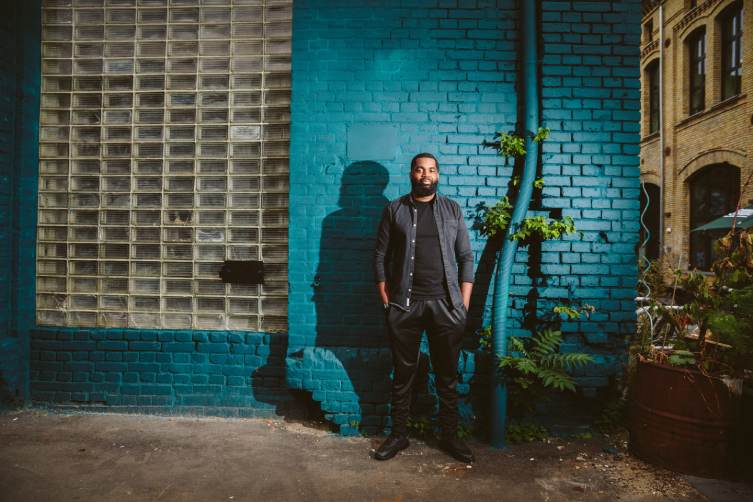
Moving Through the Ranks
MP: That's a good question. I’m trying to figure out the answer myself! (laughs) It's hard to explain, but it kind of transitions. Because again, I started doing like, I was doing local, you know, the open mic stuff. But I remember in particular it was one time where I was doing this open mic and someone came that I knew was an MD with different bands and I got him a wristband just so he could get in because he couldn't get in! (laughs)
So I just said, ‘here's a wristband’, and off the back of that I got a call a few days later and he was just like ‘I'm an MD for the group Blue, the boy band at the time. He was like, ‘I heard you play the other day, do you want to come and maybe see if you'll fit? Do some rehearsals?’ Off the back of that, that turned into touring for six months, and I mean, obviously I had to be able to play, but you know: just giving someone a wristband? Again, it’s the exposure, because it's not just the playing: it's also like; can people actually get along with you? Can you live on the tour bus with other people? So I think maybe my temperament was, ‘Okay, he's alright, he seems cool, he can play: let's give him a chance!’
And then off the back of people saying, ‘oh, blues playing in London, let's go and watch and see’, you know, people would be like, ‘oh, he sounds all right, he sounds pretty decent, let's keep him in mind’. And, you know, you exchange numbers. Then when they have something, they're like, ‘Look, are you around to do this? We saw you do Blue’.
At the end of the day, I think when it comes to bands and stuff, they just want someone that can play, get the job done, and, you know, be easy to get along with. So I think it comes to being in the right place at the right time. I hate that quote, but honestly, like, that's the only way I can put it!
Like, cause at the end of the day, I think when it comes to bands and stuff, they just want someone that can play, get the job done, and, you know, be easy to get along with. So I think it comes to being in the right place at the right time. I hate that quote, but honestly, like, that's the only way I can put it!
But I think off the back of that, if you're networking in all the right places, people will see you. And then be like, ‘I've never seen him before. seems cool or she seems cool. Let’s reach out and see if they want to jump on.
I hope that answers the question. It's a tricky one! (laughs)
GG: Hey, the only answer that's correct is the one you give me, so we're all good! Um, because you're such a pro. you've already done that thing again where you've answered a question that I had, haha! That means we're on the right track.
MP: I love that!
GG: I might go back to it in a few seconds, but you actually touched on something that I think would be quite interesting. You were invited to go along to audition, I suppose, or rehearse, or whatever, with Blue. That whole section of it - when you get the phone call and the artist is looking for somebody - that doesn't mean you've got the job, or does it? I mean,have you had instances where you've been up against other guys and then maybe you didn't get it, and how does that all work out?
MP: So, that happens. In my earlier days, you would have to audition. They'd say, ‘Look, there's an audition going down, we thought you'd be great to come down’, and you'd go down and you’d audition. That still happens quite a bit. The other one is sometimes when an MD is just like, ‘I'm going to take a chance on you’ and just says, ‘Look, we need keys for this, are you around?’
On a rare occasion, it hasn't happened to me so far, but like, someone will get a call to do rehearsals and then it doesn't work out and they’re like, ‘Look, it's not working out. We're going to have to get somebody else’, which is quite painful to see. I haven't experienced it yet, thank God, but to watch someone go through it is actually quite hard. When I did, I joined the band and they auditioned me and a guitarist. Basically, they had one guitarist and needed another one, and they basically said, ‘We've got you on board, this is great’. They gave him a Fender Twin as a gift for joining the band, which was really nice.
And then we did rehearsals for about a week and then one day I came into rehearsals and the new guitarist was like, ‘Look, I've got to go’. ‘What do you mean?’He was like, ‘It's not working out’. He was really upset. And I was kind of like, ‘Well, take the Twin! At least take the Twin! (laughs)
It was hard because the thing is, you’ll audition and they’ll be like, ‘okay, this guy is great’, but then down the line, when you get into the nitty-gritty, sometimes it doesn't always work out, which is hard.
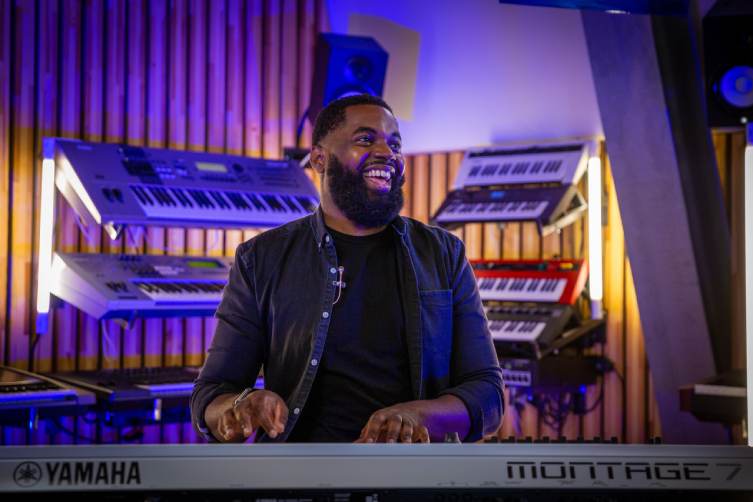
Long Distance Auditions
I'm on a tour at the moment, and obviously you can hear him from the UK. I’m touring in America with an American artist. But I had to audition. And it was interesting because a friend called and said, look, this American artist is looking for a keys player. She's holding auditions. I think you should try and go for it. So I was like, well, how is that done?
Because I'm here (in the UK), I’d have to fly to America. And they were like, ‘Well, just record yourself playing the songs’. Then they were like, I'll be honest with you: she is going to be seeing other musicians in America, so people will be going to a rehearsal space and she's gonna watch them play, but for you: film it and send it over. You never know what's gonna happen.
And so I was like, all right, fair enough! So they sent the songs and I sat at my rig in my room and literally set up my iPhone, had a little drink and I was just like, you know, I'm just gonna give it my best and see what happens! I'm playing, blaring the tunes out of my speakers and I'm just like, ‘Go for it!’ you know? Like I'm on stage. It felt weird because there's no one in the room (laughs) but I gave it all I had, recorded it, then he sent it over and I forgot about the gig. Then my friend messaged me and was like “Just thought I'd tell you, so far, you’re her favourite’. I was like, ‘no way!’ So yeah, about seven months later, here I am, still on the gig. They've flown me out, which is really cool, and I’ve found out next year she's meant to be supporting - well she is - she's supporting Ed Sheeran on his tour, so it's pretty cool!
GG: Yeah! Nice one!
MP: Yeah! The audition thing takes time because it's like: I had to learn what works for me, and auditioning is really nerve-wracking, so you get nervous and stuff like that. But I've done quite a few now where I'm like, I don't really care, I'm just gonna give it what I've got and leave it, you know? It seems to work this particular time round, so I'm not complaining to be honest!
GG: Aw yeah, I love that! What a Rocky story, you know?
MP: Haha, yeah!
Required Qualities
GG: I love that man. I'll come back to the subject of your home setup, but before we get to that, obviously, you’re a very good musician, very good pianist and synth player, but as you already said, that's one of the jobs you have to do as a touring musician. I wonder even if it's the most important one, right? Because any gig that you've got is probably not going to be making you use 100% of your skill. That's just kind of how music is. So with that in mind, you've got the musical skills covered, and so do loads of other people. What do you reckon are the most important qualities to have as someone who leads your life?
MP: As in terms of performance?
GG: I think it could be like performance, but I think it's also as much things like good timing or good hygiene, politeness, anything that contributes to being successful. You just answer how you feel!
MP: Okay, well, I’ll put it into categories: I’ll put it into ‘on stage’ and ‘off stage’. So I say off stage, the first one is you have to be likeable (laughs). You have to be likeable. What I try to do is I try to pay attention to the artist to understand how they operate.
For example, one of my first gigs was Jake Bugg, and when I first put on Jake, Jake used to make a lot of jokes, he likes to make a little fun out of you little bit. And I realised that's his way of letting you know he likes you. I’m a bit of a straight shooter so I had to learn that if he's tuning his guitar, and I'm like, ‘your guitar sounds pretty crap today’ or something, like that's a compliment for him, you know what I mean?
And it's learning like how, you know, how people kind of operate, you know? And so I think the good thing is before you get on stage, it's almost like learning who you're dealing with and who you're under, if that makes sense. And so once you learn that, you can kind of figure out how you fit in. And that's kind of off stage.
And then on stage you have to learn how you fit in musically, so again, like with Jake Bugg, they had a guitar, they had drums and bass, and they'd been playing as a trio for years before I came on board, so I had to learn where I fit in. I think most importantly, when you come into a gig and into a band, you need to understand where sonically you fit in and how you fit into the gig.
For example, when Jake Bugg solos, a lot of the time I'm just holding chords so that there's a bed of frequency that he can solo on top of, whereas when I'm playing on something like: I was playing with Mike Skinner for a while, and when I was doing that it was more just playing exactly what was on track, because he wrote the music. It's almost like a lot of the time you just need to understand where you sit when it comes to being on stage. A lot, especially for keyboard players, when there's a guitar onboard, you can clash because there’s a lot of similar frequencies.
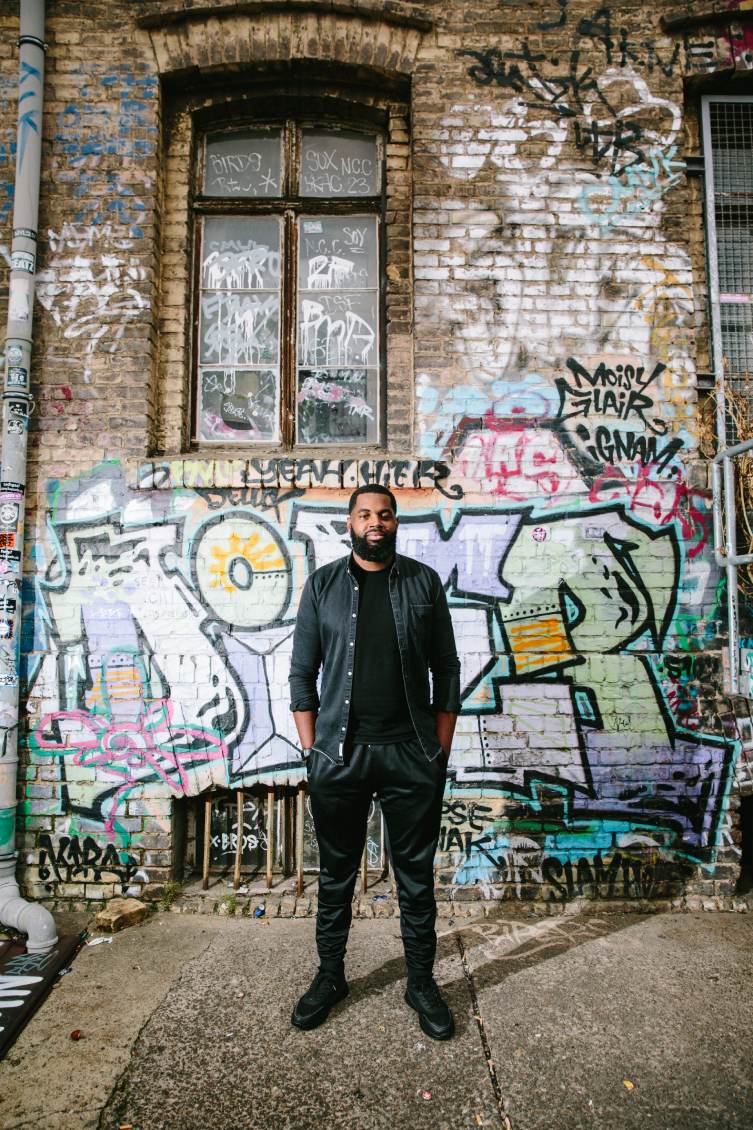
Locking Up a Gig
So, it's just - in simple terms - trying to do exactly what you're called to do, and then once you've managed to do that you can push it a little further and be like, ‘okay I'm gonna put more of my character in to show people like: okay I can play this, but I can also make it that, you know?
It's also a way of, to be honest, we like to ‘locking up’ a gig, which means basically whoever comes after you, it's really hard for them to kind of meet that, you know I mean? (laughs) That's kind of what you want to do: you want to make it so that it's like when you've left people, it's: ‘oh the way you played that song, I'm not gonna lie, there's something special about it’! That's the aim: so you get in, you get on with everybody, and then you play your part. Then after a couple of rounds, you figure out what that extra magic is that you put in, so that people are like, ‘okay, we love the way he does that’. If you go by that, I think that's a good foundation for staying on the gig at least for a couple of months, haha!
GG: Locking up the gig, that's brilliant!
MP: Yeah! That's the unwritten motto, I think.
GG: Love it! So, onstage is about locking up the gig, and offstage is about being likeable.
MP: Yeah! Offstage, the main thing is literally just getting on with everybody. I think people don't realise how important that is, because, you know, especially when you're travelling and you're touring together, dealing with literally six, seven, eight, nine, ten different characters, and I've noticed - especially now I've done an American run - but I've gone on to a tour and I've not really known anybody at all, you know? And the way they do things is slightly different so I had to find a way to kind of, apart from my accent, get everybody to be like, ‘Okay, seems like he's all right’.
I think offstage is just really learning people and paying attention. People skills are just really important. It really is, because I don't think we realise as musicians, we spend a lot of time interacting with different people. I think it really is important to understand the kind of people you're dealing with, even if they're not your cup of tea. It's like, you know, we're all human beings.
So it's learning how to get on with people. I also think if there's homework sometimes, there's times where you're going to need to really spend some time figuring some stuff out, like even for today, it’s the day off and I've got some synths, like I've played some stuff yesterday and it was like, it doesn’t feel right. I think if you can take your times off stage, make sure that everything's good, and if you've got homework… a lot of the time on tour, you'll play a show and then realise, okay, that actually doesn't work. I need to work on it. So I think off stage also be mindful when you need to come back, and go back to the drawing board and make things right.
"Now I can basically be on the plane and program a show and I can still run it from the laptop or load it into the keyboard, which is a game-changer, man!"
This next point goes with what I just said, it's just always pushing. You've always got to keep pushing. I think: don't ever get too comfortable being in a particular place. ‘Okay, I know the set, I play every night’. If you can, depending on the gig, just try and push it a little further. If you're allowed to! There’s certain gigs where you just play your parts and that's it.
But the one I'm on at the moment is like, I'm still trying to push to kind of see how far I can go. Because she's kind of like saying, ‘We love to set, like feel free to throw some stuff in. And so there's certain times where I've been like, OK, deep breath, let's just do this! And she's been like, that is great. And she loves it. So I'm like, you know what? It’s a day off.
It's not going to take me all day, I'm just going to sit and just, you know, I've got a new little synth from her, let me see what else I can cook up.
So, you know, there's a few points to, you know, help a little bit and push you.
GG: Yeah man, you're locking up! (laughs) There's an interesting thing you were saying there about people skills and how, even if people aren't necessarily your cup of tea, we're all human beings. And of course, you're having to exist for the sake of the tour. I wonder, does that also apply with music? It isn't like every single gig that you’re a part of is going to be something that you are 100% into. So is it also understanding that?
MP: Yeah. You know what? I've been grateful that I've been able to do a lot of different gigs. But I've done some gigs where it's like, I've had to kind of really stretch myself to play what's been required, even when I did Jake Bugg, because I'd never been in an indie band before.
And so it was really interesting just learning, because the thing is, especially as a musician: if I'm from R&B and gospel which I am and I go to indie rock, my ability to play and the tricks that I can pull out get very much limited because I can't pull out the gospel stuff. I can't pull out the R&B stuff really. I had to learn: okay, what can I actually do to push the boundaries where this genre of music is concerned.
I've got to figure out what's going to work. I'm going to have to do some homework. I might have to actually ask the artist and say, look, I don't understand here, but how can I push it? Or the main thing is understanding the vision of the artist, like what they want, what they're looking for so that you can push to try and achieve it.
So it's just little things like understanding: OK, how do I live in this world or live in this genre, and actually allow it to make sense, if that makes any sense?
A Sense of Having Made It
GG: Ah, it makes complete sense. That's good! And so was there any particular artist, when you were starting to get your name about and get some good touring in, was there one moment or one artist where you just went, ‘oh man, I feel like I've made it!’ I'm actually in the game here!’
MP: You know what, honestly, again, I've said his name so many times: it was Jake Bugg, because he might not have been well-known in the world that I was in, but I remember the audition. I had a family member, randomly a cousin, who was a really good friend to him, and the cousin just called me and was just like, um, I put your name down for Jake Bugg, he’s looking for a keys player. Please learn those songs! He was like, go online and look at his dates. And I went online and he'd been touring literally, like, 16 months straight.
I'd never really, I'd left the country, but I'd never gone to America or to China and all of those kinds of places, and he was going there. I literally went to bed listening to the songs. They deliberately sent a video of one of Jake's concerts, I think it was the Royal Albert Hall. I converted the video to audio and chopped it up into an album and I listened to the songs religiously.
They were holding auditions in London bridge at the time. I went there and I knew the songs like the back of my hand but what he did is, he didn't tell anybody what songs he was going to do. I learned everything!
When I came in, he was very like, some would say cold but he's not, he doesn't talk much, when he talks to me kind of mutters! At one point he was like, ‘let's do Trouble Town’ and I said to the drummer, like ‘what did he say?’ and all that. ‘Trouble Town’. Okay, cool! And we played Trouble Town and we played all these songs. After a while, Jake said to me, ‘We’re auditioning a guitarist, do you mind staying and playing alongside the guitarist?’ I said yeah no worries, the guitarist came, played, guitarist left. Then he was talking to his band and the band was saying what they thought about the guitarist. And then he said to me, ‘so Mike, what do you think? So I was like, well, I like this guy because of XYZ. So okay. And then he said, well, I'm going to be teaching the band my new music, do you want to hang around? And I was like, yeah, I'd love to. I'd love to! And I think, now is his way of saying, look, we enjoy you and we'd like you to stay.
So I stayed and off the back of that, it was like, he came up to me and he was like, well, you know, we're going to travel the world together. And the people in the past had said that to me so many times. When you're in music, everyone's like, we're going to travel. Everybody says it! But he was the only person that said it and it actually happened. (laughs) And off the back of that, we went to Brazil, Japan, Mexico, we went everywhere.
I think for me, that was the transition of doing the open mics and the local gigs to something internationally. All my friends that were from the R&B and gospel were like: how did you get that gig? we want to get like that! The thing is, a gig with Jake is like, he's always touring no matter what, so I think a lot of musicians wanted a gig that was going to be stable. I think with pop music a lot of the time, there's always a lot of changes whereas with Jake, he's just been the same kind of set up and you always do a show, so yeah, it was really good.
Life Balance
GG: All right, that's a good story! On that note actually, with a big long tour that can be months and months and months, you obviously have a life at home: you've probably got family and all these things, and you've also got your own music that you'll be working on. You don't have more hours in the day than anyone else, so how easy or hard is it for you to balance those things?
MP: It's tricky, it is tricky, and the thing is back then when I first started doing that tour, I was just happy to play. But eventually what happens is that you begin to feel like, okay, I've learned so many songs, I've played so many songs with other people, what do I want to do?
And then you start to realise, you talk to other musicians and producers, and producers will always say, look, I used to play live, but now I produce, and the noise has been up on why. And then you begin to slowly realise that if you produce music, sometimes you have more of a legacy that will last. You know, there's always going to be another gig, there's always going to be another festival, it's just how it is.
And eventually you'll get to an age where you're like, okay, I want to settle down now, I've got a family, X, Y, Z. And then you get to a point and you're like, okay, how do I do this? Do I keep touring? And then you realise you can't keep touring because you've got a family. And so you have to figure out that transition.
So I think I've got to a point now where I, I mean, I'm on tour now and I'm trying to writing music for myself and stuff, but I do want to transition and I think I've been playing for so long that I've got a sound that I want to share with the world. I want to kind of do my own thing. And I think that will happen over time. For me, it's taken a while, but other people will really be like, quite quick where it's like, you know, you just enjoy playing.
But I think because I've been touring for so long, it's got to the point where I'm able to really kind of regurgitate music quite easily, because we're not doing tools and they're like, we just need something here. You spend so much time playing that you realise, okay, this is what I'll do in this situation. And I spent a lot of time in the studio helping people with albums and stuff. So it's got to the point now where it's really interesting because I'm in America and someone reached out and said, look, we'd love to have a chat about you doing your own stuff because we love the way you play piano and piano’s my thing. I can play synth but piano’s where my heart is.
And so, yeah, I'm in a place now where I need to write some stuff for myself because I've spent time playing and doing so much for other people. I need to release something to say that if anything happens to me, I released some music that I was happy with. I'm pretty much there now!
GG: Good! I’m looking forward to that! We'll have another conversation once that’s released.
MP: Yeah, sounds good!
Pianos, Keyboards, Synths and Yamaha Love
GG: Well, let's talk about pianos, let's talk about keyboards, synths and so on! In fact, let's start with your iPhone audition story from earlier. What is your home set up for getting demos and all that stuff?
MP: So, for right now, this wasn't that long ago. Yeah, I did it in March. And I was using, on setup of the audition video, I was using the Yamaha Montage M8X on the bottom, and I had a Sequential synth on top. It was the Take 5 Sequential, which I'm enjoying! I used the Montage for piano and everything, like Rhodes and stuff like that, and then I used the Sequential for like a synth, those like a synth solo, so I used the Sequential for that.
GG: Nice, very cool. And when you're on tour, is it a similar setup? Is it the Montage as your main instrument?
MP: Yeah, Montage is the main, I've got a M8X on the bottom of an M7 at the top, and then I've got this Sequential at the side. There's little bits and pieces where it's like some really cool bits that I can put in, so the Take 5 is my go-to at the moment for like weird, cool, interesting sounds.
GG: The Take 5. Now, you've caught me out here! I do like a good Sequential, I’m a big Prophet fan, but I'm not too aware of the Take 5. Is that an analog synth?
MP: Yeah, so it's analog synth and it's... I could be wrong, I could get myself in a lot of trouble, but it has...It might have... either the oscillators or the filters from one of the Prophets, possibly. If I'm wrong, don't shoot me! The good thing about it is it's got that analog sound, but it's also got like the digital settings, so it's got a screen. I can take advantage of the sounds and change perimeters quickly and save quickly without it being too much of an analog kind of operating system.
But it really is a versatile synth, super versatile. I wish I had it plugged in to show you some sounds that I've got, but it's a great synth honestly.
GG: And with the Montage, would you have weighted keys for your main thing?
MP: Yeah. So the bottom is weighted keys, then the Montage 7 is semi-weighted keyboard keys.
GG: Yeah, a little of both. And see for your set: there's a few ways of doing it now. Some people would have the plugins with maybe Mainstage or Ableton Live and have a controller. Are you getting all your patches and your sounds saved into the Yamaha, and then you're just bringing them up and choosing them that way?
MP: Yeah, basically. The sound is coming directly. In fact, to be honest with you, the sound’s directly coming from the Yamaha Montage: not only that, I'm actually running - because our engineer was like, we've only got two stereo channels for keyboards - so my Montage 8 is obviously stereo and the M7 is stereo. What I've done is I've plugged in from the AD, I've basically plugged in my Sequential. Basically, the audio from my Sequential is coming from the Montage as well. I've only got two stereo channels but I’m running three keyboards. Because the audio is so clean and so good, I'm able to run the Take 5 from the audio of the Montage basically, which is handy.
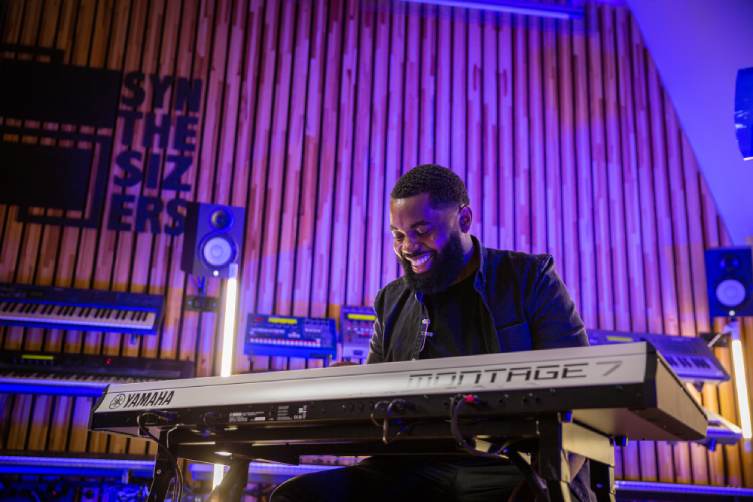
GG: I like it. There's one thing that all touring musicians know about and it's when things go about wrong, right?
If you're a guitar player it's the broken string, or it’s the battery that isn't working on your distortion pedal or whatever. If a keyboard goes down, I'm wondering what have you got as your touring failsafe? What happens?
MP: You know what's crazy? I don't think I've ever said this before. I've been playing Montages and all Yamaha stuff for a while. All the years I've had Yamaha gear, I’ve never had any of it go down. I trust it that much: with Mainstage, people always say, ‘Why don’t you use a laptop?’ and I could - and I might down the line - but I just know that Yamaha gear, it never goes down.
"That's the aim: you get in, you get on with everybody and then you play your part. Then after a couple of rounds, you figure out what that extra magic is that you put in, so that people are like, 'Okay, we love the way he does that'"
There's only been one time that a Yamaha piece of gear has gone down, and that's because I wasn't looking after it. Like, I used a Motif rack for years, such a long time that the connection for the power cable started getting loose. It just needed some attention, but I was like a teenager, so I was just running it into the ground. I literally used this thing every day for about 13 years, religiously. And one day I was on stage playing, and it was just this thing where, if you moved the power cable, it would restart itself. I remember someone was dancing on stage, and this artist had dancers, and the dancer nudged the module during the song. You just heard this massive pop and it just restarted (laughs) So while the band were going for it, I was just there waiting for my keyboard module to restart.
But yeah, I've never had problems with Montages or Motifs. So it's like, if something's wrong, then I'll always blame everything else apart from the keyboard! So yeah, I don't really have a backup to go on this week where they're concerned. If one does go down, I've got the upper to switch to anyway, because it's unlikely that two Montages are going to crash at the same time. And if they did, it'd probably be like a venue thing, I think. So it's a risk I’m willing to take!
GG: Yeah, man: either a venue thing or armageddon, then it doesn't matter what's going to happen!
MP: Yeah, leave the keyboards! (laughs)
Game-Changing Apps
GG: Exactly! Okay, cool. So how about this one: One piece of equipment that you can't live without. What is it?
MP: Any keyboard?
GG: Any anything.
MP: Anything. (pauses to consider) Give me my laptop.
GG: Okay.
MP: For several reasons: because Montage now have software that I can edit all my patches via laptop anyway. It's the middle ground. If anything goes down, I can still make music, I can play a gig off my laptop. Yeah, I think in terms of like on a whole, give me my laptop.
GG: Ah! That actually helps you with that previous question! If all of your patches are saveable or findable - then it’s kind of like how it is for digital guitar players: you can plug your Helix into your laptop and get all your sounds and settings back. So, that could maybe save the day if your Montage went down, because you've got it all backed up on your laptop, right?
MP: That's the reason why I said the answer because I was like, now I do need the keyboard but I can basically still play all of my patches - my whole performance, my whole setup for any gig - via my laptop because of the Yamaha software. I think it's called ESP. It's a game changing app because people are always like, ‘your keyboard is so heavy!’ I'm like yeah but now I can basically be on the plane and programming a show and I can still run it from the laptop or load it into the keyboard, which is a game changer, man! Definitely a game changer!

A Vangelis Story
GG: Even just off-topic for a second: see Yamaha synthesizers? Are you much of a fan of people like Vangelis?
MP: Oh man, I've got a Vangelis story as well!
GG: Oh have you? Why don’t you tell it? All I was gonna say was: isn’t it great that, even though keyboards are heavy, they’re nothing like as heavy as things like the Yamaha CS80 - the Vangelis/Blade Runner synth, right? It’s hundreds of kilograms!
MP: Yeah, absolutely!
GG: Okay, tell us your story!
MP: Obviously the CS80 was made before I was born, but I went to Japan and I got to see a CS80, and when it was turned on it sounded like a whole computer machine: like, those things are massive, like massive! But yeah, going back to Jake Bugg again. I'm talking about him a lot! Jake made friends with Vangelis, like they got on really, really well randomly! Really well and it was Vangelis's birthday and Jake was saying to me that he didn't know what to get for Vangelis because they really bonded on you know music and production. He spent a lot of time with him, and I think at the time the Yamaha Refaces had just come out and I don't know how it came about but I said to him, you should get him a Reface CS. He was like, ‘what's that?’ So I was like, ‘Basically, the CS80 that he used to use: this is basically like a small compact version, but it kicks like a horse’. And so for one of Vangelis’ last birthdays, he got him the Reface CS, and Jake told me ‘Look, that guy loves that CS, he loves it!’ (laughs)
And I just thought that was so interesting that, you know, Vangelis had been using the CS80 for so long, and then got gifted the CS, and he absolutely adored it as well, which was incredible. So yeah, he also told me that, you know, they’d sit and have dinner together, and chat and stuff like that. So yeah, man.
GG: Wow, what a cool story! And how strange that I just decided to bring that up, and you had a Vangelis story?
MP: Yeah! yeah. And another thing, my first ever talent contest in school, When I started playing in assembly, I was a nerd, and I didn't really know too many songs, but the only song I knew at the time was Chariots of Fire, so I played that when all the kids were walking into assembly! (laughs) So yeah, random, man!
GG: Haha, there you go! The big man himself! From your school assembly to your world tour!
MP: I know! He's a legend man, he's a legend.
GG: And of all the people, Jake Bugg I wouldn't have guessed would be the guy to make friends with Vangelis!
MP: Yeah, crazy. I think they also liked really soundtrack-y kind of soundscape stuff. Jake’s really into that as well.
Sometimes he'd get on the piano when we used to rehearse and he’d play some really nice pads and really atmospheric music. So I think him and Vangelis, they really got on really well. He told me that he spent a lot of time talking about music and stuff. So yeah, it's a small world, man.
GG: A small world indeed!
A Final Question
GG: My final question for you, Mike. It's one of those final question questions. So, just as we've been doing, you just answer this as and how you feel like it. But what would your dream gig be? And that can mean venues, artists, alive or dead, whatever. Go for it!
MP: You know, it's funny…
GG: Don't say Jake Bugg.
MP: (laughs) Can you imagine? Haha! Like, it's tough because to be honest with you, I've always said over the years, like, I've had a different artist I'd like to work with: I've said, this person, that person… I'll be completely honest and I hope I don't offend anybody saying this.
I'd love to play my own show at this point.
GG: Yeah!
MP: I've played for so many people and I love supporting other people’s careers but I want to be selfish and be like: I want to play my own show. I don't know where it would be, but I think in the past I'd say Stevie Wonder because he's great, I think he's got some great tunes. He's released a new album like two days ago, like a whole brand new album but yeah, I think I'd like to back myself once and just say I'd like to play my own show, to be honest with you, as a pianist..
GG: That's a great answer man, and that's actually the best answer that I could have hoped for on that one!
Well, that was not only one of the most fun conversations I’ve had in a while, it was also one of the most informative! Mike’s positive attitude is obviously as important as his musical ability in terms of him becoming such an in-demand musician.
I had a real blast talking to Mike, and had no idea that we’d up up fan-boying about Vangelis! I hope you got some useful insights from Mike: he’s somebody out there doing it and living that dream. If this interview conversation has lit a fire under you, then grab that energy and see where it takes you! There’s everything to gain!

